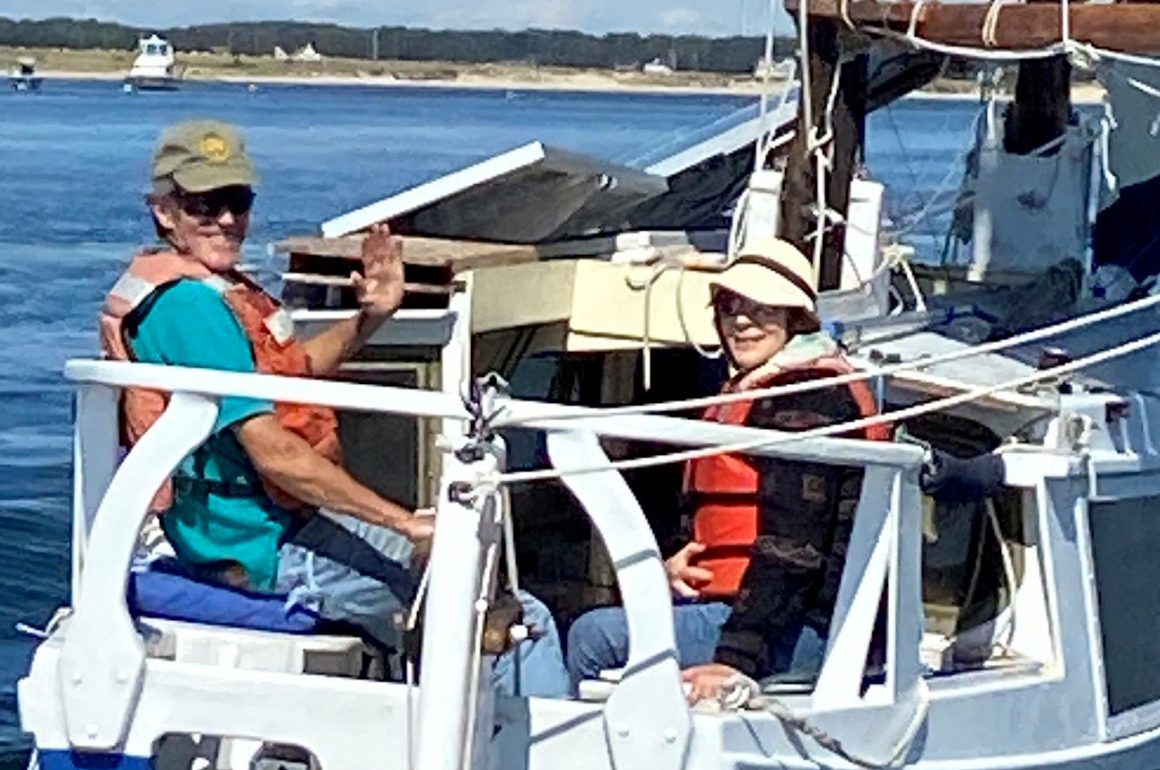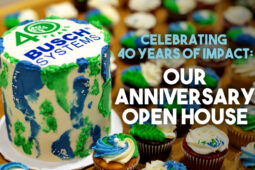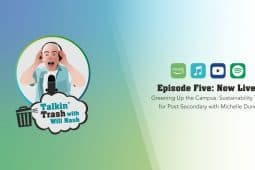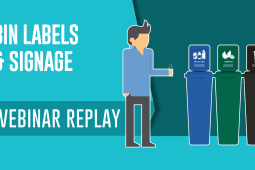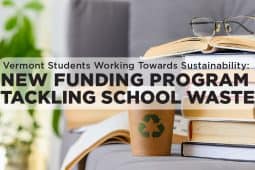It was always interesting to learn what people had studied in school. Gathered with fellow campus recycling managers at an NRC conference reception or dinner after a CURC workshop, you’d learn that someone had pursued a biology or philosophy degree. I was a history major. My wife, a former campus recycler-turned-sustainability manager, was a poly sci major.
There was a common denominator that characterized many in the informal network of people that evolved into the CURC/ Recyc-L community in the ’90s. With few schools offering degrees in environmental science or sustainability at that time, a large number of first-generation higher ed recycling managers were drawn into their positions, not through academic training, but as student advocates. The same late 1980’s wave that drove the growth of recycling across the US also swept college campuses, energized by students who saw an opportunity to make a difference. Most of those students eventually graduated into their respective professional fields. For some, the experience resulted in a detour away from our intended career. For others, student positions helping to launch recycling programs turned, post-graduation, into a facilities job managing the very same program.
Rob Gogan was already well into a career in higher ed administration when he took a turn towards recycling. He’d earned a BA from Hampshire College and a master’s from Boston University, and already worked for a decade as a college administrator and English teacher. Looking to take the next career step, he enrolled at Harvard in the late 80’s to pursue a doctoral degree in higher ed administration. But while others focused on becoming future leaders of school districts and institutions, Rob found himself increasingly distracted by the amount of paper he saw in the trash. Perhaps not with the same sense of destiny as those around him, he joined others in lobbying for a proper recycling program. And like many fellow campus recyclers, administrators eventually said, fine, why don’t you do it. So, he did.
Thirty years later, Rob is signing off with a well-deserved retirement as Harvard’s recycling manager. As the score of well-wishing responses to his announcement on Recyc-L will attest, he has earned the respect and affection of his counterparts across the country during that time. Through his time as a board member of both the College and University Recycling Coalition (CURC) and RecycleMania, a regular presence at NRC and AASHE conferences and frequent contributions to the Recyc-L listserv, Gogan has endeared himself to others with a passionate belief in waste reduction and good-natured friendliness. In the process, he’s made a difference, building Harvard’s recycling and zero waste into a leader that recovers over 60% of the waste stream and pushed the school towards a 28% drop in overall waste generation over the past 14 years.
The Early Days
Rob took time earlier this month to chat with me as he was closing out his last few weeks on the job. We’ve known and worked together for nearly 25 years, going back to my own time managing waste and recycling at a university in California.
“Recycling used to be it”. Looking back on how things have changed, Gogan was referring to both the extent of the university’s sustainability focus as well as the early ambitions of their waste reduction agenda. “Reduce” and “reuse” were central to the long-term vision, but like most campus efforts at the time, the priority focus was simply on keeping high volume commodity materials like paper, cans, and bottles out of the trash. Striving for a 50% diversion rate was a wildly ambitious goal. Even when the term “Zero waste” came into use in the late ’90s, it was considered more of an abstract concept than a realistic goal to pursue. “We couldn’t imagine much more than recycling” in those early years.
Recycling, of course, was a sexy topic. Like many campus recycling managers at the time, Gogan was the only person working to “green” the campus. And like many others, there was a certain bittersweet feeling in the early 2000s as enthusiasm and resources began to shift toward broader sustainability issues. He’s quick to praise the university’s sustainability efforts of the last few decades, but at the same time, “it was kind of heartbreaking” for many campus recyclers. There was a new kid on the block, and recycling was increasingly viewed similar to indoor plumbing by the green community on campus, appreciated but taken for granted.
Rob has continued to advocate the relevancy of waste reduction throughout. He points with pride to several reuse initiatives he’s launched, including Harvard’s Valentine’s Day Cosmetics Drive that for fifteen years has collected donations of unused makeup and toiletries for local family crises centers. Beyond its waste recovery objectives, the drive has become an annual tradition as a way for the campus community to reinforce the beauty and dignity of women who’ve experienced domestic abuse. Rob also built up the school’s robust surplus property program. He shared stories about receiving calls from Nobel laureates looking for chairs and supplying surplus office equipment to John Dean’s presidential campaign. Over the years, he’s organized to send over 100 shipping containers of Harvard’s used furniture and equipment to countries like Honduras, the Dominican Republic, and Ghana, as well as Haiti after the 2010 earthquake. “I felt like Robin Hood. Taking from the wealthiest university in the world and giving to some of the neediest people.”
Finding “a Sympathetic Audience” With The CURC Community
“The role of campus recycling coordinator can be pretty lonely, especially in the days before the sustainability departments.” Our conversation drifted from Harvard to the early days of CURC, which originally stood for the “College and University Recycling Caucus”, later to become a “Council” and eventually the “Coalition” it is today. “We were working with union guys who drive trucks or oversee landscape service people and maybe retired military. You know sustainability is not why they’re working in that job.” Rob was describing an experience many of us had on our respective campuses. Recycling is institutionalized into most campuses today, but to be a campus recycling manager in the early 1990’s involved working to change long-standing routines and practices of everyone from tenured professors to the custodians who emptied their waste basket. You might be a hero to student environmental activists, but you were a nuisance to a much larger group of people who thought the trash bin in the hallway worked just fine. Connecting with other recycling managers was an opportunity to “find a sympathetic audience that really got the whole picture of ‘hey we’re saving the planet, don’t you understand?’”.
What evolved into CURC began as a loose gathering of campus recyclers meeting on the edges of the annual National Recycling Coalition conference. The CURC-organized sessions, as well as conference receptions and after-party gatherings, were bonding experiences that launched decades-long friendships (and even a marriage or two) with like-minded colleagues around the country. Rob and I swapped stories. There were the infamous Steel Recycling Institute parties that were a highlight of the early conferences. We remembered hanging out as a group at baseball games that happened to be scheduled alongside the conference in different cities. Rob recalled the skit parodying a campus recycler’s experience that he did in Cincinnati with Kurt Teichert (Brown University), Erica Spiegel (University of Michigan, later University of Vermont), CJ May (Yale) and Pete Pasterz (Michigan State) among others. Beyond being a networking and bonding experience, these gatherings were a chance to recharge and stoke your enthusiasm to keep pushing change from your cubicle in the basement of the facilities dept.
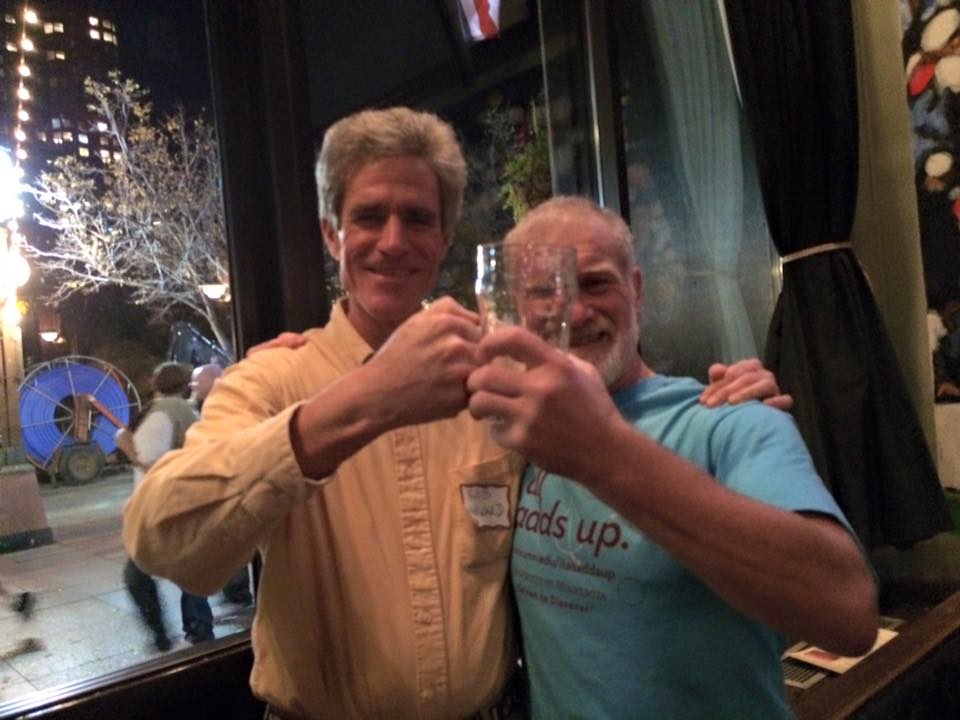
Rob with Dana Donatucci at a CURC social in Minneapolis
Getting Competitive – The Rise of RecycleMania
One of the early (and continuing) challenges one faced was how to compare different schools’ programs without a common way of measuring performance. You might share how many tons of material you recovered, but was it based on loose estimates, conversion formulas, or actual weights? Did your diversion rate include construction and demolition material or account for waste prevention efforts? Did your school even track how much it collected? Rob collaborated with others from CURC to develop a common set of standards for comparing higher ed programs in the late ’90s. The next problem was how to get people to actually use the standards. A partial answer came a few years later in the form of a friendly competition between two Ohio universities.
Launched in 2001 by Stacy Wheeler at Miami University and Ed Newman at Ohio University, RecycleMania was initially envisioned as a way to leverage the school’s football rivalry to generate student enthusiasm for recycling. Gogan loved the idea and asked if Harvard could participate the next year. By spotlighting how much schools recycled or composted on a per capita basis, Rob and others recognized an opportunity to build off CURC’s efforts, both emphasizing the importance of tracking performance data and to apply a standard methodology used by everyone. He also understood that involving Harvard at the start would attract other schools and provide an inviting target for recycling managers looking to whip up student enthusiasm with the prospect of beating the otherwise untouchable ivy league school at something. The program soon took off, doubling the number of participating schools each year eventually hitting a high mark of over 600 colleges and universities across Canada and the US. Both Gogan and I were active in RecycleMania (recently re-branded the Campus Race to Zero Waste) during this time, myself as the program manager and Rob as a member of the steering committee.
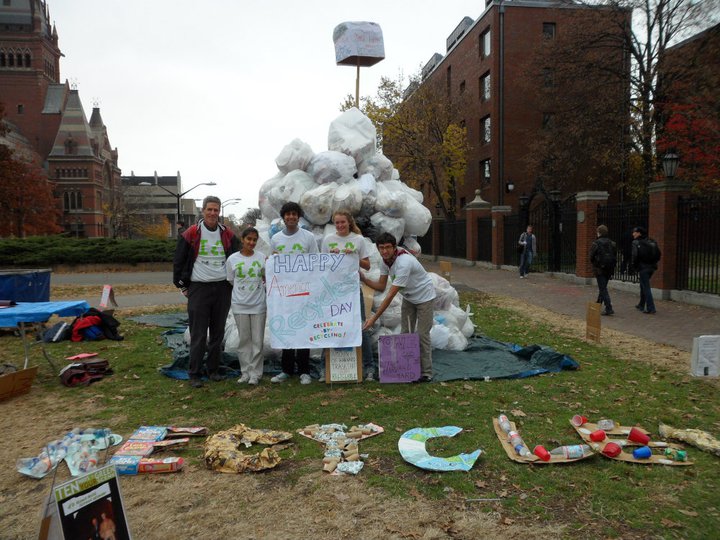
Rob with students at a Harvard America Recycles Day event
Sloof Lirpa’s April Surprise
One April day as RecycleMania was taking off, Rob posted a seemingly earnest email to the Recyc-L listserv. Construction on the Harvard campus had revealed thousands of pounds worth of old Harvard Crimson newspapers, long ago buried for unknown reasons. Riffing off the “Garbologist” Alan Rathje’s research from the 1980s showing how newspapers could remain preserved for decades in a landfill, Gogan was asking other campus recyclers if it was appropriate to count the additional tonnages with his reports to RecycleMania. The post generated a flurry of responses condemning this as a counter to the spirit of the competition. Rob’s annual April Fool’s day emails and the confused and sometimes credulous responses became a Recyc-L tradition in the years that followed. The emails, which often featured expert testimony from Sylvester “Sloof” Lirpa, highlight arcane or newly “revealed” issues having to do with trash and recycling. One year focused on adding a new collection stream for used tissues generated by a hard flu season. Other years focused on composting “Biotically Active Regurgitated Food” or highlighted a quandary of about how to collect a non-existent type of PETE polymer. As the response emails invariably showed, Rob’s April Fools emails successfully straddled the line between the just-barely plausible and outright absurd while bringing a smile to readers’ faces.
Advice to New Campus Recyclers
Returning to the present, I asked what advice Rob would offer those just entering the field. Gogan pointed out that our generation of campus recycling managers always saw waste prevention as a priority, but most of our efforts inevitably focused on the easier-to-accomplish task of keeping items out of the landfill. In some ways, campus recycling managers were treated as an outsider by both the facilities and sustainability colleagues. Facilities people often viewed recycling as a non-essential, feel-good operation designed to mollify students. Similarly, sustainability offices have tended to treat waste reduction as a purely downstream facilities operation with minimal relevance to campus greenhouse gas reduction goals.
Rob made the case that the job for new campus recyclers is to change these perceptions, working in the process to break down the silos that disconnect how an institution consumes materials from how it manages the resulting waste. College and university administrator’s objectives include managing both procurement and waste practices cost-effectively, while the sustainability office focuses on circular economy solutions. New campus recyclers/waste reduction managers should work to advance a sustainable materials management approach that bridges these separate interests. Using their position at the table, they should advocate upstream purchasing practices as well as personal and institutional consumption patterns that result in less material passing into the waste stream. Pursuing this strategy, one can make a difference reducing institutional costs, while reinforcing the integral role waste reduction efforts have in a climate action strategy: reducing the substantial GHG emissions that a university’s wasteful consumption practices cause before those future waste items even enter the campus.
Retirement Plans
Rob is looking forward, of course, to not having to make a daily commute that could involve hours of walking, cars, trains and even cross-country skiing depending on the time of year. Rob is a lifelong Bostonian and sailor, having developed a passion for the open water from his grandfather, himself a lifelong sailor and son of a lobsterman. He plans to spend more time with his wife, Fran, and two grown sons, on the 26-foot sailing boat they own, the Blue Moon.
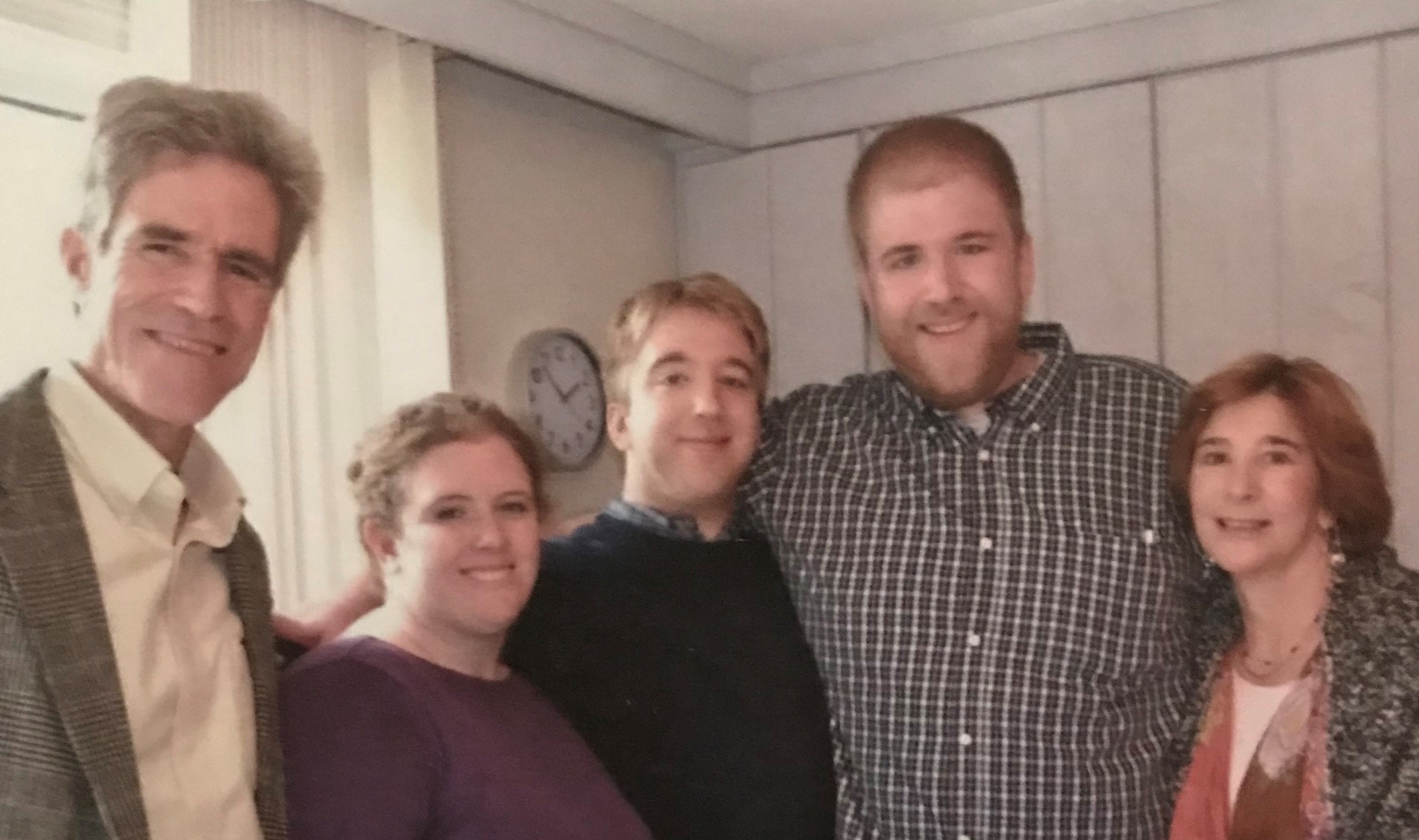
L. to R.: Daughter-in-law Grace, son Zach, son Josh, wife Fran
Even as Gogan leaves Harvard, he told me of plans to stay active in recycling locally as a board member of MassRecycle and support other community efforts. Just his love of the natural environment has inspired his career, he wants to use his free time to continue connecting people to nature. “I think that’s a big part of what’s missing. We are so deeply impoverished when we’re cut off from the natural world. And it’s something that’s free for everybody.” In general, Rob said he wants to fulfill his role as a citizen. Illustrating that point, we had to wrap up our conversation as he was scheduled to make campaign phone calls in the run-up to the election.
It was a pleasure to chat for an hour with Rob, just as it’s been a pleasure for his many Harvard colleagues and fellow campus recyclers to work alongside him over the years. We all send our congratulations and good wishes as he passes the torch on to a new generation of campus recyclers.

